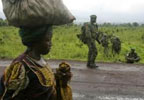
BUKAVU, Democratic Republic of Congo — Rwandan troops wearing Congolese army uniforms are turning up in the key mining area of Walikale, civilian and military sources tell Enough, just a week after news spread of an alleged agreement between Presidents Kabila and Kagame to grant the Rwandan army permission to launch an operation on Congolese soil.
Rumors of the new operation emerged just a day after President Kabila announced a ban on mineral exploitation in Walikale, saying that communities near the mining areas have suffered under the armed groups involved in the illicit minerals trade. The decision was then extended to the entire North and South Kivu and Maniema provinces. President Kabila also announced that the army in the region would be shuffled to tackle the problem of Congolese soldiers exploiting the trade.
Two battalions of the Rwanda Defense Forces allegedly arrived in the region via Ruvungi, a border trail through Kibumba, just north of Goma. The trail is the Congo-Rwanda smuggling route; trucks with Rwandan license plates were often seen along the route filled with minerals headed for Rwanda during the joint Rwanda-Congo military operations early last year, according to several sources.
Neither government has publicly discussed the involvement of Rwandan soldiers in a new operation, but they have acknowledged that the Congolese army is prepared to launch an offensive against the Democratic Forces for the Liberation of Rwanda, or FDLR, a rebel group notorious for its abuses against Congolese civilians and its ties to perpetrators of the 1994 genocide in Rwanda.
The confluence of these developments – the mining ban, reshuffling of the army, deployment of Rwandan troops – indicates that a major shake-up is afoot in eastern Congo. But whether President Kabila’s decision is going to have its intended effect of cleaning up the minerals trade is still highly questionable.
Though never officially acknowledged, a major consideration for both the Congolese and Rwandan governments is how to deal with the rebel National Congress for the Defense of People, or CNDP. To tame the rebel force, President Kabila agreed to integrate CNDP fighters into the national army, but the integration never really took. In many cases, CNDP fighters maintained allegiance to their commanders, and commanders maintained control over their localities; they simply traded uniforms. The CNDP effectively set up a parallel administration in Masisi with tacit agreement from the Congolese government, which tried and failed, time and again, to defeat the group militarily.
The Tutsi-dominated CNDP’s original link to Kigali was widely acknowledged, but relations took a turn for the worse when it became clear that the CNDP could become a bargaining chip to improve relations between Rwanda and Congo. As part of a deal struck in early 2009, CNDP leader Laurent Nkunda was arrested and put under house arrest in Rwanda. Rwanda maintained its influence via Nkunda’s successor, Bosco Ntaganda, who, despite war crimes charges from the International Criminal Court, became a commander in the Congolese army during the integration. More recently, Rwanda has grown anxious about alleged ties between the CNDP and exiled former chief of staff of the Rwandan army, Faustin Kayumba.
While the Congolese and Rwandan governments share an interest in redeploying the CNDP elsewhere in Congo (Bas Congo has been discussed as a possible location), it’s a job that won’t be accomplished easily. During a recent meeting in Goma of the leadership of the two CNDP factions, they vowed to “set the region on fire” if ordered to deploy outside of the Kivus, FARDC senior officers who wanted to remain anonymous told Enough.
With the alleged deployment of Rwandan battalions in Walikale, it appears that Rwandan troops and CNDP rebels are set on a collision course. And as civilians have warned since the earliest rumor of this operation, clashes between the Rwandan soldiers and the CNDP will likely take a heavy toll on the communities in the crossfire.
In the volatile environment that will likely ensue, it is not long shot to speculate that the region’s minerals will be up for grabs. Pursuit of the FDLR has long been a pretext for Rwanda to gain access to Congo’s mining areas and then create a violent diversion.
Photo: A woman walks past Congolese soldiers (AP)

